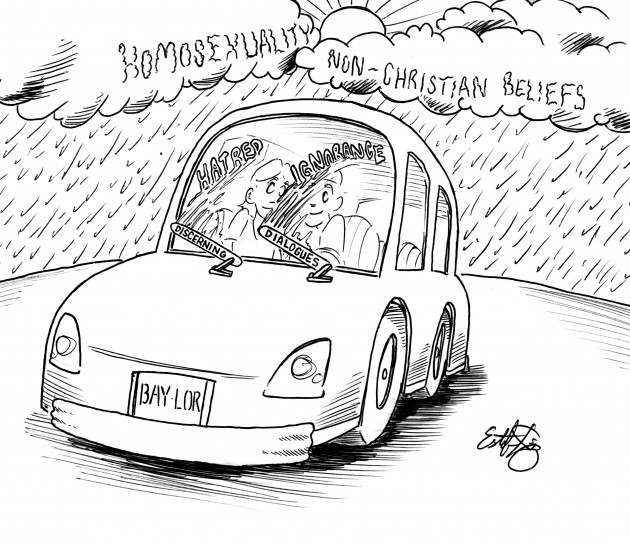
Last Monday, Baylor took a step toward fostering on-campus discussion of sensitive issues. Students met in an information-gathering forum, the results of which will help determine the topics discussed at the Discerning Dialogues program beginning next semester.
In Discerning Dialogues, students will participate in discussions facilitated by students trained in moderating. Students in attendance will talk on topics, such as lesbian, gay, bisexual and transgender (LGBT) students, religious beliefs and even hot-button governmental policy issues.
At last Monday’s forum, the aforementioned topics were among the topics most requested to be discussed at Discerning Dialogues.
Last semester the Lariat complimented Baylor after the Princeton Review released its list of “LGBT Unfriendly” schools, showing Baylor went from 11th in 2010 to unlisted in 2011. With the inception of Discerning Dialogues, we again applaud Baylor for its step in the right direction in creating an on-campus environment of understanding.
As we did last semester, though, we also must point out how we can further make students of different sexual orientations, religions and political views feel welcome and accepted at Baylor.
An area of concern we see with Discerning Dialogues is that it will be led by students who receive instruction from Baylor administrators prior to conducting the event.
There are positives to having trained students, as any productive discussion needs direction to keep ideas flowing.
“The last thing we want to do is have a forum where people are at odds and there’s no consensus about what’s good for our university,” dean for student development Dr. Elizabeth Palacios told the Lariat.
However, we fear that these student leaders might steer away from points on topics if the discussion begins to contradict Baylor’s policies.
As we’ve said before, we would never expect the university to support groups and discussions advocating for ideas that contradict Baylor’s policies. At the same time, we want students to feel comfortable tackling these issues considering the free flow of ideas that exists in the world and society around us.
Perhaps Adam Short, president of the Sexual Identity Forum at Baylor, said it best when he said “When it’s a student-run group with student officers … I feel as if that’s very much needed for students that want to really discuss sexual identity and sexuality in a comfortable setting.”
This is why we’re more open to students running their own discussions without training or direction from Baylor administrators. Sure, administrators can be in attendance to make sure these student leaders don’t advocate ideas opposing Baylor’s views, but Baylor doesn’t need to tell these students beforehand how to direct the conversations.
Discerning Dialogues can be a vehicle for progress on our campus. Over the course of many discussions, there might be less misunderstanding between students of differing viewpoints and personal beliefs. As the Princeton Review indicated, we’re moving forward on at least one sensitive topic by not being “LGBT Unfriendly.”
There are many other topics on which we can work to expand our knowledge and understanding. Whether student- or administrator-led, Discerning Dialogues has the potential to open minds and make Baylor students even more well-rounded that they already are.






